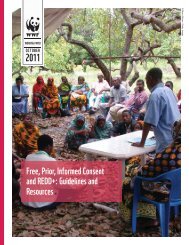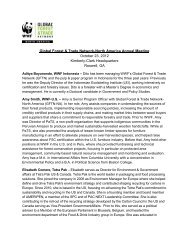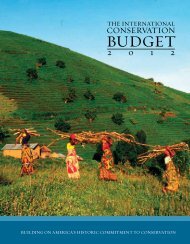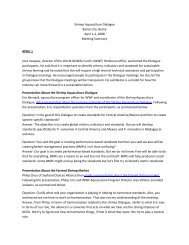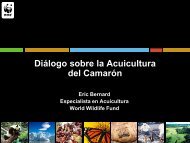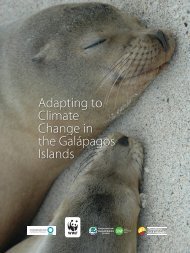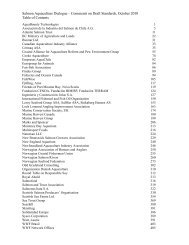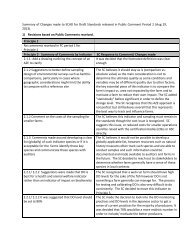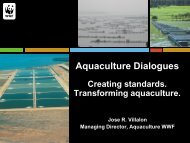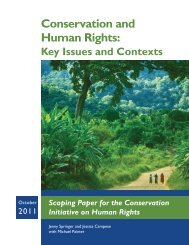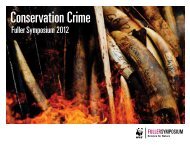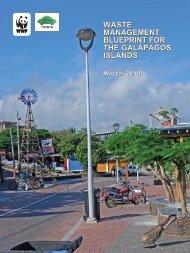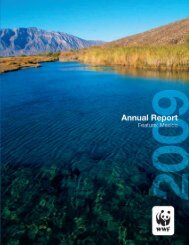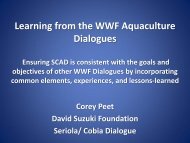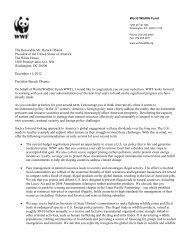Amazon - World Wildlife Fund
Amazon - World Wildlife Fund
Amazon - World Wildlife Fund
You also want an ePaper? Increase the reach of your titles
YUMPU automatically turns print PDFs into web optimized ePapers that Google loves.
phOTO couRTEsy of David Cheng, © FREDERick J. WeyERhAEusER / WWF-cAnon<br />
© ROGER Leguen / WWF-cAnon, © FREDERick J. WeyERhAEusER / WWF-cAnon<br />
The permanent metal roofs WWF provided for homes like this in the<br />
Trongsa district help improve villagers’ living conditions, reduce labor<br />
needs and protect the forests.<br />
Working with WWF, David Cheng – Walmart’s global sourcing director –<br />
explains the company’s timber sourcing policy and requirements to suppliers.<br />
Saurus crane numbers have stabilized in Vietnam’s Tram Chim National<br />
Park thanks to a partnership between WWF and The Coca-Cola Company.<br />
Local residents, such as this fisherman from Bazaruto Island in Mozambique,<br />
benefit from WWF’s work to secure sustainable funding for conservation.<br />
as a valued livelihood asset<br />
and are now promoting<br />
wildlife management on<br />
vast tracts of land where<br />
poaching is no longer acceptable.<br />
Since its inception,<br />
the program has<br />
grown to include more<br />
than 235,000 community<br />
members in 59 registered<br />
communal conservancies<br />
across Namibia, covering<br />
more than 32 million acres<br />
of prime wildlife habitat.<br />
It has shown remarkable<br />
success in increasing the<br />
populations of such rare<br />
species as the black rhino<br />
and top-of-the-food-chain<br />
predators such as the desert<br />
lion. Human welfare is also<br />
improving, thanks to the<br />
more than $5.7 million in<br />
annual income and benefits<br />
the conservancies generate<br />
for the communities.<br />
As a result of this huge success,<br />
Namibia’s Communal<br />
Conservancy Tourism Sector<br />
was recently nominated as<br />
one of three finalists in the<br />
<strong>World</strong> Travel & Tourism<br />
Council’s “Tourism for<br />
Tomorrow Awards.”<br />
PRESERVING TREES BY<br />
USING ALTERNATIVE<br />
ROOFING MATERIALS IN<br />
bhutan<br />
A significant demand<br />
on forest resources in<br />
Bhutan comes from the<br />
need for roofing materials,<br />
traditionally made of<br />
fir tree shingles or bamboo<br />
thatching. Harvesting<br />
these materials places a<br />
real strain on natural resources,<br />
endangers habitat<br />
critical to the red panda,<br />
and requires enormous<br />
amounts of villagers’ time.<br />
Thanks to private contributions,<br />
WWF has been<br />
able to provide corrugated,<br />
galvanized iron roofing<br />
sheets as an alternative<br />
roofing material. These<br />
sheets, which last for 30<br />
years, reduce the strain<br />
both on natural resources<br />
and villagers’ labor.<br />
Through this initiative so<br />
far we have provided iron<br />
roofing sheets to more than<br />
500 households in different<br />
parts of the country, eliminating<br />
the need to cut down<br />
approximately 700 trees<br />
every year. Within the 30-<br />
year lifespan of the roofing<br />
sheets, about 21,000 trees<br />
will be saved.<br />
MARKETS<br />
SHIFTING CHINESE<br />
forestry TOWARD<br />
sustainability<br />
China’s growing economy<br />
continues to place more<br />
pressure on the planet’s<br />
resources. Through the<br />
WWF-led Global Forest &<br />
Trade Network (GFtn),<br />
WWF is working in China<br />
to influence economic<br />
development that goes<br />
hand-in-hand with longterm<br />
sustainability and<br />
environmental protection.<br />
In particular, GFtn is<br />
working with committed<br />
companies like Walmart,<br />
the world’s largest retailer,<br />
to harness the power of<br />
China’s international trade<br />
flow in ways that reduce<br />
China’s ecological footprint<br />
on forests.<br />
Walmart and GFtn recently<br />
cohosted a training workshop<br />
on responsible timber<br />
sourcing for the company’s<br />
wood suppliers in Shenzhen,<br />
China. Attendees included<br />
Walmart’s top suppliers of<br />
wood products to the U.S.<br />
market. At the workshop,<br />
GFtn showed these suppliers<br />
how to mitigate the<br />
risk of sourcing and trading<br />
illegally harvested wood by<br />
establishing a responsible<br />
purchasing program and<br />
committing to sourcing<br />
credibly certified wood.<br />
FACILITATING<br />
environmental<br />
stanDARDS FOR SOY<br />
The Roundtable on Responsible<br />
Soy has adopted<br />
voluntary sustainability<br />
standards that will help<br />
move soy production toward<br />
more environmentally sound<br />
and socially responsible<br />
methods. The standards are<br />
the result of years of<br />
dialogue among WWF,<br />
other nongovernmental<br />
organizations, farmers and<br />
the soy industry.<br />
The standards call on soy<br />
producers to avoid clearing<br />
native forests and other high<br />
conservation value areas.<br />
They also require farmers to<br />
take measures to protect the<br />
environment, such as reducing<br />
greenhouse gas emissions,<br />
soil erosion, water use and<br />
pollution, and eliminating<br />
use of the most hazardous<br />
pesticides.<br />
The roundtable estimates<br />
that responsibly produced<br />
soy will be available by<br />
March 2011.<br />
Partnering TO<br />
CONSERVE FRESHWater<br />
IN VIETNAM<br />
In 2007, WWF and<br />
The Coca-Cola Company<br />
launched a transformative<br />
partnership to conserve the<br />
world’s freshwater resources.<br />
Among the sites chosen for<br />
this endeavor was Tram<br />
Chim National Park in<br />
Vietnam. One of the last<br />
natural wetlands of the<br />
once vast Plain of Reeds<br />
ecosystem, Tram Chim<br />
is situated in the Mekong<br />
Delta, a freshwater source<br />
for 60 million people. For<br />
decades, this region has<br />
experienced serious environmental<br />
damage, resulting<br />
in dwindling habitats<br />
and disappearing species.<br />
Through the partnership, a<br />
conservation team has been<br />
working with local governments<br />
in Tram Chim to address<br />
freshwater issues. The<br />
team has successfully implemented<br />
hydrology management<br />
that mimics the<br />
historic flood pulse of the<br />
Mekong; removed 400 meters<br />
of internal dykes to improve<br />
river connectivity and<br />
flow; and established natural<br />
resource user groups to<br />
help alleviate conflicts over<br />
declining resources.<br />
Significantly, the partnership<br />
team advocated for<br />
wetland policy reform and<br />
helped to pass a new statute<br />
that allows for park management<br />
in accordance<br />
with the particular wetland<br />
ecosystem. As a direct result<br />
of the partnership efforts in<br />
Tram Chim, bird numbers<br />
have increased dramatically.<br />
The number of endangered<br />
Sarus cranes has stabilized,<br />
and in 2009 the critically<br />
endangered Bengal florican<br />
was sighted for the first time<br />
in nearly a decade.<br />
CREATING SUSTAINABLE<br />
FINANCING FOR<br />
CONSERVATION IN<br />
MOZAMBIQUE<br />
WWF is always looking<br />
for innovative new ways<br />
to finance conservation<br />
projects around the world.<br />
One complex financing<br />
mechanism that has been<br />
used successfully in numerous<br />
projects is the environmental<br />
trust fund. Most<br />
recently, WWF negotiated a<br />
“debt-for-nature swap” program<br />
with the French and<br />
Mozambican governments<br />
to establish such a fund to<br />
protect conservation areas<br />
in Mozambique.<br />
Under this plan, the French<br />
government will reduce<br />
some of Mozambique’s debt<br />
in exchange for the government<br />
of Mozambique channeling<br />
about $10.6 million<br />
of its debt payments into<br />
conservation programs.<br />
Half will go into BioFUnd,<br />
a new conservation foundation<br />
being launched<br />
this year to support<br />
Mozambique’s conservation<br />
areas network, and the<br />
other half will be allocated<br />
to the country’s Quirimbas<br />
National Park.<br />
Entities such as BioFUnd<br />
are established by WWF<br />
as independent organizations<br />
with their own boards<br />
and staff. Their purpose is<br />
to continue raising money<br />
and making investments<br />
that enable them to maintain<br />
sustainable sources of<br />
conservation funding for<br />
specific regions.<br />
18 worlDWildliFE.ORG/pulse Pulse: The hEART of consERvATion 19



